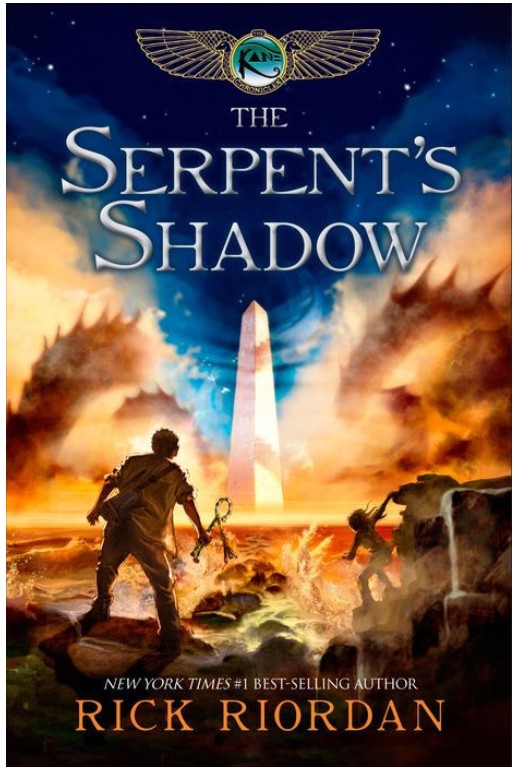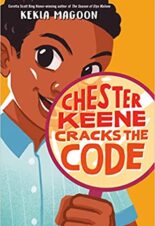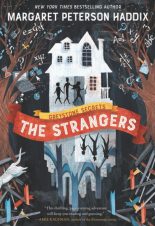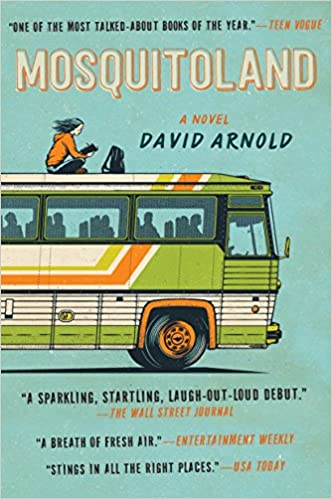
Buy This Book
“Writing sort of…. rounds off the sharp edges of my brain…. Either way, you should write. It’s better than succumbing to the madness of the world.” Aunt Isabel. – Mosquitoland
Mosquitoland
by David Arnold
AR Test, Strong Female
12+
Score
5.2
384
After the sudden and unexpected divorce of her parents, Mim Malone is dragged from her Ohio home. Mim’s happy life collapses when she’s forced to live with her father and his new wife in “Mosquitoland,” otherwise known as the middle of Mississippi.
When Mim overhears a conversation, she finds out her mother is sick, and something in Mim snaps. Mim runs home, packs a bag, steals her stepmother’s stash of money, and boards the next Greyhound bus out of town, starting her almost thousand-mile journey from Jackson, Mississippi to Cleveland, Ohio.
On her bus is a cast of quirky characters—some annoying, some creepy, and some, like her seatmate Arlene, kind. When the Greyhound bus tips over in the middle of a rainstorm, what would have been a straightforward trip, spirals into an interesting journey into the unexpected. On this new journey, Mim finds unexpected friends in Beck, a college student on a trip to find his old foster sister, and Walter, a boy Mim’s age with down syndrome, who is homeless. With the help of these new friends, Mim begins to realize she is not alone in this world, and that while she is struggling with events in her life, she does not have to struggle alone.
While the trip started as a plan to see her mother, Mim’s trip morphs into a journey of self-discovery and acceptance. Mim is a strong-minded and independent, but also an imperfect person. She describes herself as a “collection of oddities, a circus of neurons and electrons.” Mim explains “my heart is the ringmaster, my soul is the trapeze artist, and the world is my audience. It sounds strange because it is, and it is, because I am strange.” Readers will relate to Mim because she does not strive to be perfect. Instead, she recognizes her quirks and problems, and, as a teenager, she knows she still has much to learn.
Throughout Mosquitoland, Mim explains that she is “not okay.” She struggles with an unspecified mental illness, and her world seems to be falling apart because her family fractured when her parents divorced. At first, Mim is attempting to go home, back to the life she had with her mother in Ohio, but throughout the trip, she realizes “home is hard.” She learns that she will never have her old life back – a life she somewhat idolizes – and that leaving her old life behind is for the better. Mim realizes that home is not a “place or a time,” maybe “home is the heart . . . an organ, pumping life into my life.”
Mosquitoland is beautifully written, with witty dialogue and memorable characters. The story is written from Mim’s point of view, who has a very unique narrative voice. Readers get insight into her perspective of the world and her hilarious internal dialogue on various topics, including baseball games, shop signs, and teenage girls. Moreover, her point of view is interspersed with letters to her unborn sister, explaining why she decided to leave Mississippi and documenting her feelings about the trip.
Mosquitoland explores the heavy subject matter of mental illness and sexual assault. Mim explains that throughout her life, she has often questioned her sanity and her father has often thought there is something wrong with her. Mim goes to psychiatrists and therapy and is prescribed medication, but often questions if this medication is necessary. Mim’s family has a history of mental illness. Mim’s aunt committed suicide and her mother is currently hospitalized for depression. This book also discusses sexual assault, as an older man forces himself on Mim and kisses her. This experience traumatizes Mim and she often has flashbacks to this moment. Plus, she becomes anxious around men who remind her of the man who assaulted her. Furthermore, she feels incredibly guilty for not speaking up about this man’s actions before he assaults another girl. Mim shows the readers her vulnerability in these moments, the tough persona she presents to the world is broken down, and readers see Mim as someone who is just trying to figure life out and survive.
Overall, Mosquitoland is a funny and entertaining book, with memorable, relatable characters. While it does touch on some difficult topics, this is balanced with a lighthearted tone and humorous plot. Beyond being a coming-of-age story about Mim coming to terms with her life and finding herself, it is also a story about the power of friendship.
Sexual Content
- When Mim was younger she liked her friend’s older brother. Mim explains that she “was sexually attracted to Steve insomuch as I was an indiscriminate preadolescent girl.” When she was a year older, she still liked him. As he drove Mim home one night she explains, “new images sprang to mind: less boxing-ring-chest-pounding, more bedroom-floor-topless-romping.”
- Mim imagines what high school girls should be talking about. She thinks it’s “argu[ing] over who gives the most efficient blow job.”
- After a long, deep conversation, Mim and Beck, the older boy she has a massive crush on, fall asleep with “Beck hold[ing] Mim . . . on the floor well into the night.” Mim explains, “[w]e don’t talk. We don’t need to. Sleep is close, and I’m okay with that . . . At some point, he carries me to bed and lies down next me. . . He wraps an arm around me, and I swear we were once a single unit.” As Beck rolls over in the bed, “he rolls sideways, toward me, his face hovering over me. We stare at each other for a second, silent, unmoving . . .And I sense the move before it comes. Beck leans in, slowly, and kisses my forehead. It isn’t brief, but it’s gentle, and full of sadness and gladness and everything in between.” Mim wonders “how it would smell-taste-feel to have his lips pressed against my own, to feel his weight on top of me.” The two never go past the kiss as Beck reminds Mim, “I’m too old for you.”
Violence
- In the beginning of her journey, the Greyhound tips over. Mim observes, “it’s a simmering stew of glass and blood and sewage and luggage, a cinematic devastation . . . Some people are moving, some are moaning, and some aren’t doing either. Carl is bleeding in about six places, administering CPR to one of the Japanese guys. I see Poncho Man help Amazon Blonde to her feet, right where I’d been sitting. I stand and stare for i-don’t-know-how-long, until an ax crashes through the left wall—formerly the roof of the bus. Firefighters crawl through the wreckage like ants, pulling limp bodies around their shoulders, administering first aid. Two EMTs . . . approach the limp body of a woman. The redhead leans over, puts his ear to the woman’s chest. Straightening, he looks at his partner, shakes his head.” Mim realizes the woman is dead and she is Arlene, Mim’s seat mate, who she has bonded with during the trip. In the accident, Mim received “just a cut.”
- Mim accidently becomes locked in the bathroom with a man she has nicknamed “Poncho Man.” He comes on to her, getting closer to her. When she pulls away, he grips her aggressively and tries to kiss her. “His lips are cold against mine,” Mim explains. In order to get away from him, Mim forces herself to throw up, launching “a vomit for the ages directly into Poncho Man’s mouth.”
- When she was younger, a bully calls a friend of Mim a “retard.” Mim punched the bully “breaking his nose and earning a one-day suspension.”
- Caleb, a suspicious young man she meets in the woods, tells Mim his dad “used the beat the hell outta [him] with household appliances . . . [and] for no good reason, too. [His dad] wasn’t a drunk . . . He was just fine at it sober. But one day, I was all growed-up, see. So you know what I did? Pulled the fire extinguisher out of his garage and beat the shit out of him.”
- When Mim figures out Caleb is planning to steal from Walter, she and Walter run back into town. Caleb chases them on to the roof of a gas station, where he pulls “a sizeable hunting knife” on them. Eventually, the owner of the gas station, Ahab, who just happens to know karate, comes up to the roof and begins to fight Caleb. “A blurred figure plummets on top of him, knocking him to the ground. Within seconds, Caleb is back on his feet, wielding the hunting knife at this new adversary . . .The fight doesn’t last more than a minute. In a roundhouse kick that would have made Jet Li proud . . . [Ahab] sends Caleb’s hunting knife sailing over the edge of the roof. With him disarmed, it’s hardly a fight at all. A couple of hook-kick combos and graceful strikes to the chest, arms, and head, and Ahab has a whimpering Caleb trapped in a half nelson on the gravel.” Ahab keeps Caleb in his “clenches” until the police arrive.
- When Caleb begins to insult Ahab, “without thinking twice, Ahab lifts Caleb up by his hoodie, and punches him once, twice, three times in the face. Blood splatters across the gravel roof, as well as a single tooth.”
- Beck reveals that he saw a young girl exit a bathroom, eyes “puffy and red from crying.” Afterwards, Beck sees a man exiting the same bathroom, and Beck realizes what this man had done to the young girl. Beck “punched him. Twice. In front of a cop.” The man is arrested because the “little girl spoke up.” Mim realizes that predator responsible was Poncho Man, the same man who assaulted her.
- Beck recalls that he had a foster sister whose father had just been released from prison. Unfortunately, a few weeks later her dad was “stabbed to death in a drug deal.” Beck’s foster sister “shut herself in the upstairs bathroom. We could hear her sobbing all through the house,” Beck explains. “I kicked down the door, found her in the tub. She’d slit her wrists.”
- When Mim is six her aunt “hung herself in our basement. . .I found her hanging there, her feet dangling inches from the floor – inches from life.”
Drugs and Alcohol
- Mim is prescribed “aripapilazone” or “abilitol.” Mim takes these pills a few times. Although it is prescribed by a psychiatrist for her mental health issues, she is unhappy taking this medication and stops.
- When she was young, Mim and her mom used to go to a block party every Labor Day. She remembers “beer buckets” and her mom drinking beer.
- As he talks to Mim, the Greyhound bus driver “lights a cigarette [and] takes a drag.”
- When Mim stops at a gas station, the “young girl behind the counter blows a giant bubble with her gum and offers [her] free cigarettes.”
- When Mim meets Caleb, he “pulls a pack of cigarettes from his pocket, sticks one in his mouth . . . and lights up.”
- In memories from her childhood, Mim remembers her mother and father “drinking beer” in various instances.
- When Mim was nine years old, she discovered that her father smoked, and he allowed her to try one. Mim “pulled out a cigarette, surprised by how light it felt in my fingers. Dad lit the end, then told me to breathe in deep. I followed his instructions and inhaled deeply, deciding Dad was way cooler than I’d given him credit for. This was immediately followed by my hacking my lungs out, then throwing up on my mother’s favorite Venetian blinds. I couldn’t taste anything for a week. It was my first and last cigarette.”
- When Mim is forced to move to Mississippi she really wants to take her mother’s couch. She tells her father, “I would literally jump off the roof while simultaneously swallowing a bottle of sleeping pills,” before leaving the couch behind.
Language
- Profanity is used occasionally. The profanity includes shit, fuck, bitch, jackass, dick, bastard.
- When she was younger, Mim witnessed a bully call a friend a “retard.” When she asks her mom what that word means, her mom explains “retard is a mean word used by mean people.”
- Beyond the use of regular profanity, this book also uses words that are profane-esque, including “effing” or “muthafuckas.”
Supernatural
- None
Spiritual Content
- Beck asks Mim if she “believe[s] in God.” Mim tells a story, explaining when she was “maybe four years old,” she was with her mom running errands. Mim saw a man with “a really deformed face . . . so with the tact of a four year old, [Mim] pointed right at his cheek and asked what happened. He smiled even bigger and said God made him that way.” Mim continues “the prospect of there being a God scares me. Almost as much as the prospect of there not being one.”
- Beck says he definitely believes in God. He says, “My heart must continue beating in order to pump a red liquid called blood through tiny tubes called veins throughout this unit called a body. All my organs, in communication with my heart, must work properly for this carbon-based life-form called Beckett Van Buren to exist on this tiny spinning sphere called Earth. So many little things have to be just so, it’s a wonder we don’t just fall down dead.”
- When visiting her mother, Mim “ponder[s] the peculiarities of an angry Almighty.” She explains, “[a]nd now I know. I see it in the medicated drool dripping from the face of my once youthful mother. I see it in the slew of trained specialists assigned to her keeping. I see it in the Southwestern motif, from floor to ceiling of this nightmare called Sunrise Rehab, and I know what makes God when He’s angry: a person with the capacity for emptiness . . . a drained emptiness. A person who was once full. A person who lived and dreamed, and above all, a person who cared for something – for someone. And within that person, he places the possibility of poof – gone – done – to be replaced by a Great Empty Nothingness.”
“Writing sort of…. rounds off the sharp edges of my brain…. Either way, you should write. It’s better than succumbing to the madness of the world.” Aunt Isabel. – Mosquitoland
Latest Reviews

Legends: The Best Players, Games, and Teams in Baseball
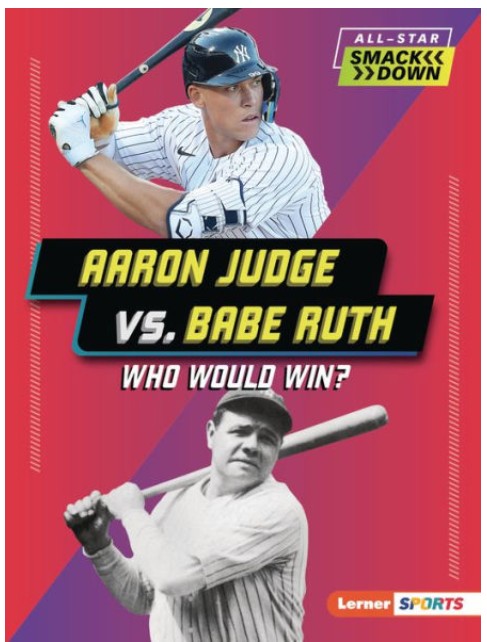
Aaron Judge vs. Babe Ruth: Who Would Win?

Rascally Rabbits: And More True Stories of Animals Behaving Badly
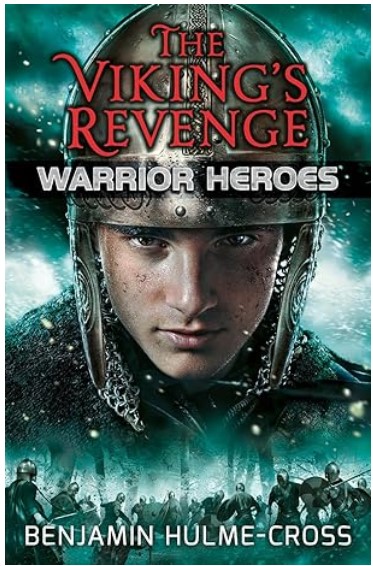
The Vikings Revenge
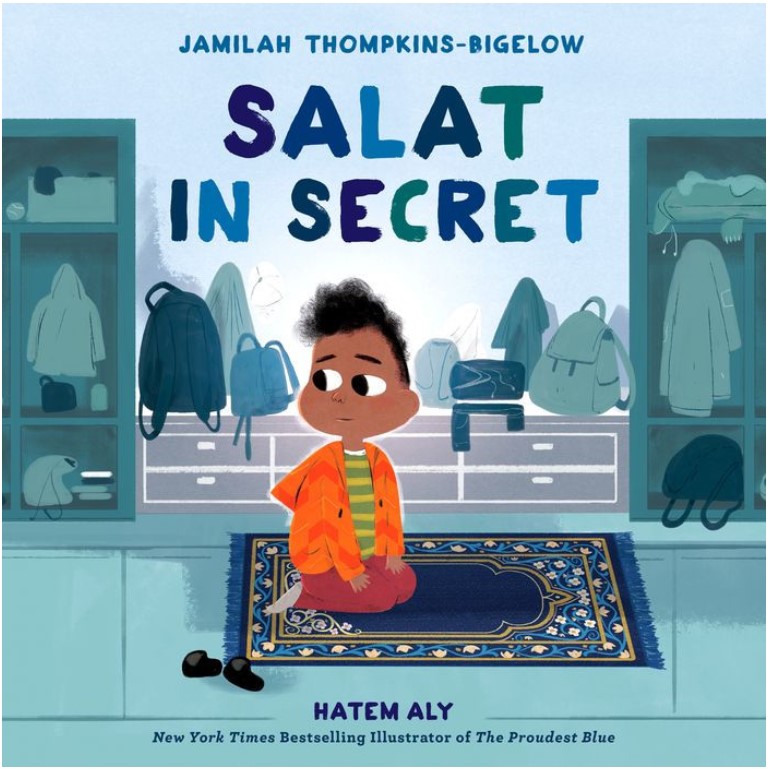
Salat in Secret

Strength of the Mountains

Stay
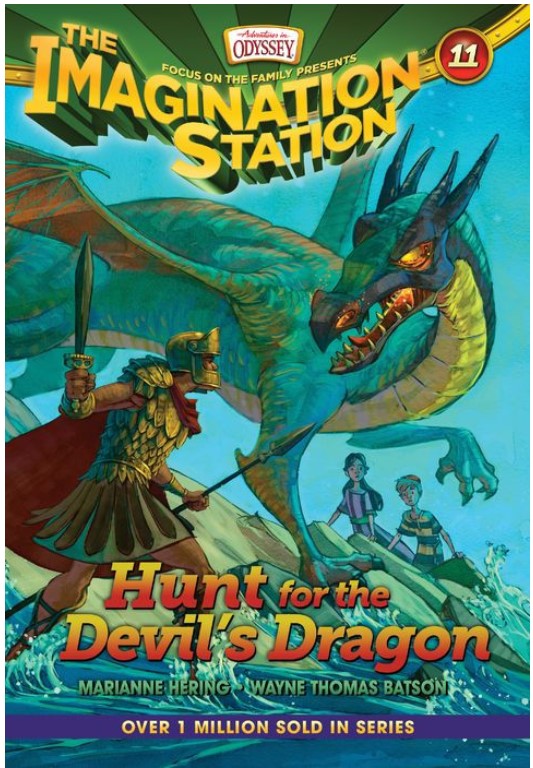
Hunt for the Devil’s Dragon
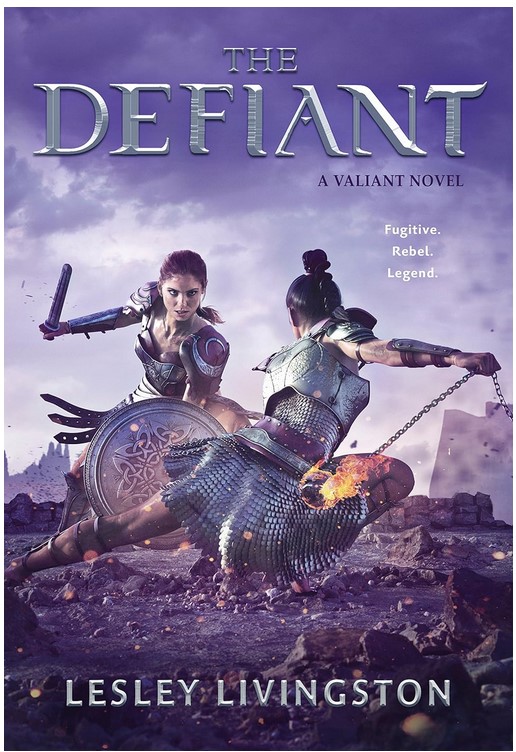
The Defiant
